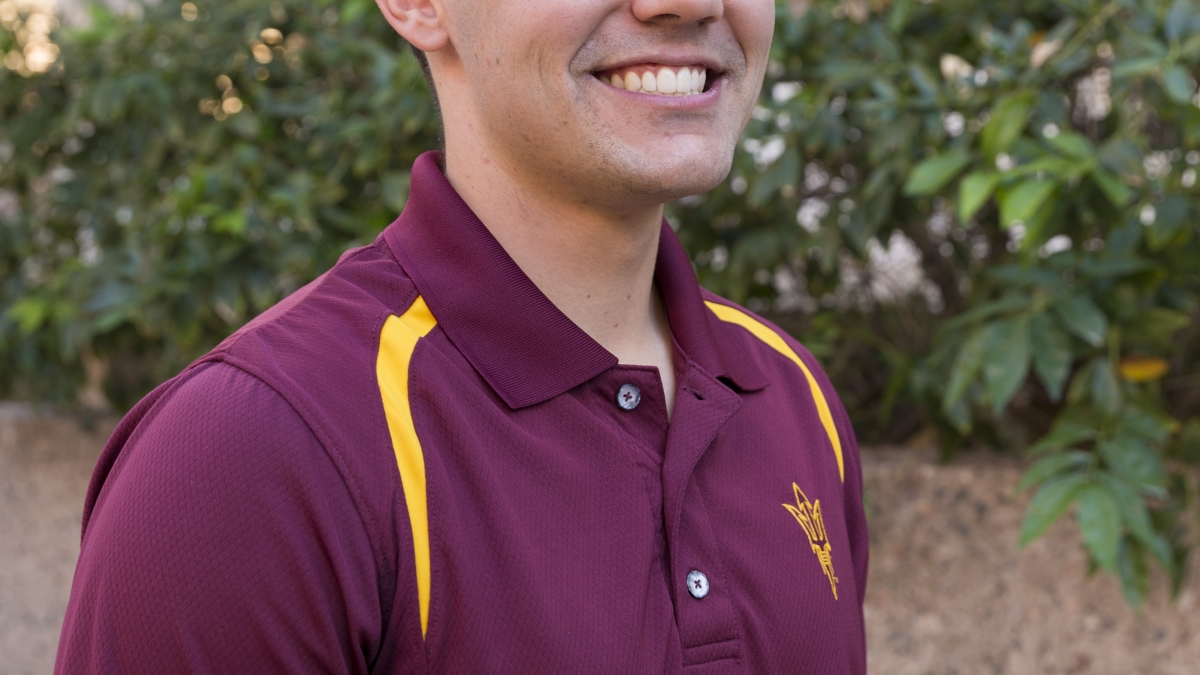'I'm interested in building systems that enable more natural interaction with technology'

John James "JJ" Robertson was selected as the fall semester's Outstanding Graduate in Computer Science in ASU's Ira A. Fulton Schools of Engineering.
An introduction in high school to the wonders of information technology was all the motivation John James “JJ” Robertson needed to major in computer science in the Ira A. Fulton Schools of Engineering.
But he was driven to go further by a desire to explore the entire landscape of the computing world. So, he added an electrical engineering major to give him the math and physics courses that his quest required.
That ambitiousness is reflected in the plethora of achievements that highlight his undergraduate track record, including:
• lead authorship on a research paper published in the Cyber Defense Review journal
• three research journal publications and awarding of a provisional patent
• a research grant from the Army Research Office Undergraduate Research Apprenticeship Program
• winning top prizes in major hackathons — team computer programming challenge events — at Georgia Tech and in the national Hack Arizona competition
• a member of first-place teams in the Intel Shanghai Cup robotics competition and the Allstate Virtual Assistant Challenge, an artificial intelligence technology and machine-learning techniques competition
• won ASU coding competitions hosted by the Zappos online clothing company and the Goldman Sachs finance company
Question: How do you plan to change the world with your engineering skills?
Answer: I am interested in building systems that enable more natural interaction with technology. This includes things like virtual assistants and self-driving cars.
Q: What things have been most rewarding during your undergraduate years at ASU?
A: Applying what I learned in the classroom in extracurricular projects, through the Software Developers Association student organization and doing research in the Cyber-Socio Intelligent Systems Lab. These things allowed me to hone my technical skills while solving real-world problems.
Also, participating in coding competitions and hackathons enabled me to track how my technical skills progressed and allowed me to network with industry representatives.
Q: What was a particularly memorable moment?
A: At a conference, I was able to have lunch with Peter Norvig, who is the director of research at Google. That was pretty surreal.
Q: Were there particular experiences that told you that you were on the right path?
A: Going to hackathons around the country, where you spend 36 to 48 caffeine-filled hours building something from scratch and demoing it. That was great fun, and it and validated my decision to major in computer science and electrical engineering.
Q: What are your plans after graduation?
A: I will be moving to Venice, California to join Snapchat as a software engineer, working on computer vision-related work.
Q: What are your long-term career aspirations?
A: Building systems that are able to better understand their surroundings will change how we are able to interact with technology like self-driving cars. I am also very interested in the field of computer vision, which aims to build such systems.
Q: How do you see your future?
A: I would like to be in a role where I am able to make a lot of the technical decisions that go into building a product that impacts many people.
More Science and technology

Study reveals genetic insight into desert survival
The deserts of the American Southwest are home to the Mojave and Sonoran desert tortoises, two seemingly similar yet genetically…

Study reveals lasting effects of common weed killer on brain health
Environmental exposure to toxins in the air, water or certain chemicals can increase the risk of ill health effects, including to…

ASU grad to use science to get an edge on crime
Editor’s note: This story is part of a series of profiles of notable fall 2024 graduates.As a child growing up in Pinetop,…